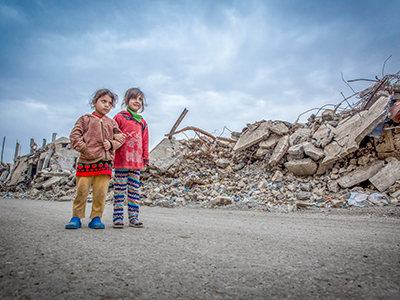Cover image: © UNICEF/UN0161148/Anmar
About the course
This course covers UNICEF commitments and practical guidance on risk-informed, conflict-sensitive and peacebuilding programming. It introduces tools staff can (and should) use to analyze risk and conflict in the field and to design, adjust, implement and monitor programmes that foster resilience, sustainability, peace and social cohesion.
The course draws on UNICEF Guidance for Risk Informed Programming, UNICEF Guide to Conflict Analysis and Programme Guidance on Conflict Sensitivity and Peacebuilding.
At the end of the course the learner will be able analyze risks to children and vulnerable groups and will be equipped with the resources they need to elaborate a basic risk analysis and conflict analysis. The learner will also be able to better design, implement and monitor risk-informed programmes that foster resilience, sustainability, peace and social cohesion.
Learning objectives
Upon successful completion of the course, you should be able to:
- explain what risk-informed programming is and how the new global landscape is making risk-informed, conflict-sensitive and peacebuilding programming essential to all of UNICEF’s work;
- use new tools to conduct a basic child-sensitive risk analysis;
- understand fundamental concepts related to conflict and peace and be able to conduct a basic child-centered conflict analysis;
- access the tools you need to design, adapt and implement risk-informed programmes that foster resilience, peace and social cohesion;
- ensure risk-informed programmes that foster resilience, peace and social cohesion are part of integrated programming and programming in specific thematic areas;
- identify and guard against potential negative unintended consequences of the programme – ensuring that UNICEF programmes “Do No Harm”; and
- begin to monitor risks, conflict sensitivity, risk-informed and peacebuilding programmes.
Audience
UNICEF staff - including seasoned staff and new staff - and UNICEF partners.
Length
The total duration of this course is 120 min.
Methodology
This is an asynchronous self-paced course – you can choose to take it all in one day, over a week or during a longer period of time.
Structure
The content of the course is presented in seven interactive modules:
- Module 1: Introduction to Risk-Informed Programming
- Module 2: Analysing Risks to Children and Vulnerable Groups Part 1 – Risk Analysis
- Module 3: Analysing Risks to Children and Vulnerable Groups Part 2 – Conflict Analysis
- Module 4: Designing and Adjusting Programmes that contribute to resilience, sustainability, peace and social cohesion.
- Module 5: A Deeper Look at Designing and Adjusting Programming – sectoral and cross-cutting areas
- Module 6: UNICEF and Conflict Sensitivity
- Module 7: Monitoring risks and UNICEF’s risk-informed and peacebuilding programme
Contact details
Vanessa Anne Wyeth, Global Lead – Conflict Prevention, Fragility and Peacebuilding, Programme Group Leadership Team
Jen Stephens, Global Lead – Disaster Risk Reduction, Climate, Energy, Environment and DRR Team
